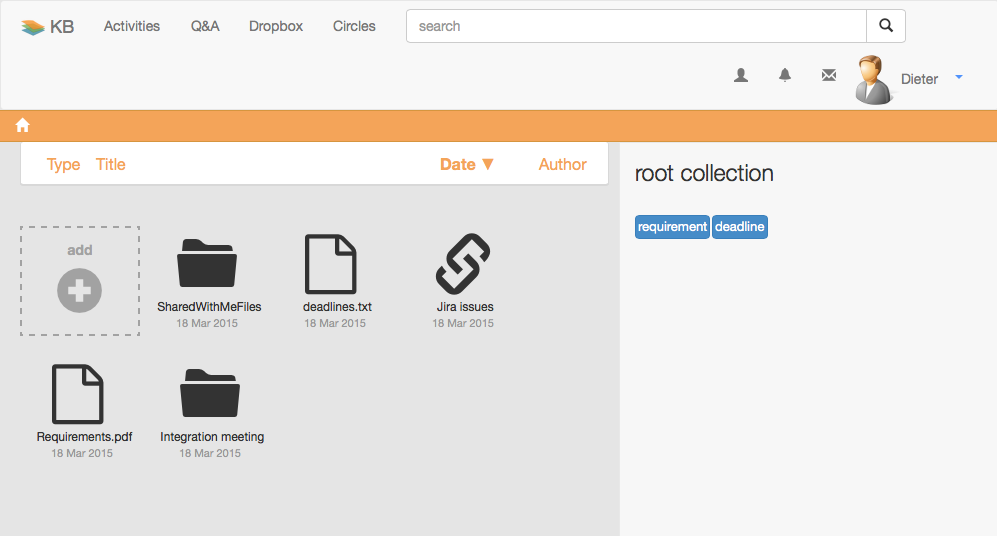KnowBrain (KB) [1] is an open source Dropbox-like knowledge repository with social features for informal workplace learning.
As such, KB can support, integrate and foster various collaborative learning processes related to daily work-tasks. KnowBrain is self-hosted, indicating that it can be hosted on the own servers within an enterprise, which ensures data privacy and gives direct control over the whole system. The main Dropbox-like user interface is visualized in Figure 1.
Share and collaboratively structure knowledge
Access knowledge via sophisticated content-and metadata-based search and recommendation
Discuss artefacts by means of multimedia-enriched Q&A
Feature list
- Collaboratively collect and structure knowledge
- Reuse and share information within a single platform
- Access information via search and intelligent recommendation mechanisms
- Enable multimedia-enriched Q&A, discussions and chats

Uses
- Within KnowBrain users can create circles that enable them to work in groups and share resources with selected users and friends, or even with the public community. Circles can be splitted and merged so that resources and users assigned to groups can be re-organized.
- Users can collaboratively enrich resources with tags and categories. Moreover, users can vote (up or down) or assign stars to resources.
- KnowBrain enables users to discuss resources and raise questions with regard to particular topics of interest
- In terms of KB, activities of collaborators can be followed via user- and group-based profiles, to allow KB users to keep track of all kinds of digital traces users leave behind. This way, users can better understand their learning or working groups and acquire relevant knowledge to further minimize interruptions of the ongoing meaning making process.
Tech specs
KnowBrain is self-hosted, indicating that it can be hosted on the own servers within an enterprise. It opts for openness and loose coupling of functionality by decoupling client-side business (i.e., solely relying on HTML, CSS and Javascript backed-up by the AngularJS framework from server-side REST-based infrastructure (i.e., the SocialSemanticServer (SSS), in comparison to monolithic and closed systems as they can be found in (organisational) knowledge repositories (e.g., Moodle or Blackboard from within the e-learning scene, or Sharepoint from within the enterprise content management area). Thus, KB is easily extendable, if new affordances are required to fully support informal workplace learning. KnowBrain is open-source software and can be found in the Layers GitHub.
The Story
KnowBrain is designed for workers and learners that intend to effectively and efficiently communicate and collaborate with different disciplines in the digital world in order to overcome today’s challenges in industry and research. Moreover, KnowBrain acts as a demonstration scenario and testbed for the services of the SSS.
Research
An online evaluation of tag recommender approaches implemented within Layers was conducted, in which KnowBrain was used in a real-world setting. The results revealed that our 3Layers algorithm outperformes a MostPopular baseline not only in offline settings but also in this online evaluation scenario [2] [3]. Furthermore it was shown that the uptake of tags greatly increases the shared understanding amongst learners [4].
Contact
Dominik Kowald, Ilire Hasani-Mavriqi, Dieter Theiler, Sebastian Dennerlein, Tobias Ley, Elisabeth LexLinks
References
- S. Dennerlein, D. Theiler, P. Marton, P. S. Rodriguez, J. Cook, S. Lindstaedt, and E. Lex, “Knowbrain: An online social knowledge repository for informal workplace learning,” in Design for Teaching and Learning in a Networked World, Springer, 2015, pp. 509–512.
- P. Seitlinger, T. Ley, D. Kowald, D. Theiler, I. Hasani-Mavriqi, S. Dennerlein, E. Lex, and D. Albert, “Balancing the Fluency-Consistency Tradeoff in Collaborative Information Search with a Recommender Approach,” International Journal of Human–Computer Interaction, vol. 34, no. 6, pp. 557–575, Jun. 2018. DOI: 10.1080/10447318.2017.1379240
- D. Kowald, P. Seitlinger, T. Ley, and E. Lex, “The Impact of Semantic Context Cues on the User Acceptance of Tag Recommendations: An Online Study,” in Companion of the The Web Conference 2018 on The Web Conference 2018, 2018, pp. 1–2.
- S. Dennerlein, P. Seitlinger, E. Lex, and T. Ley, “Take up My Tags: Exploring Benefits of Meaning Making in a Collaborative Learning Task at the Workplace,” in European Conference on Technology Enhanced Learning, 2016, pp. 377–383. DOI: 10.1007/978-3-319-45153-4_30
